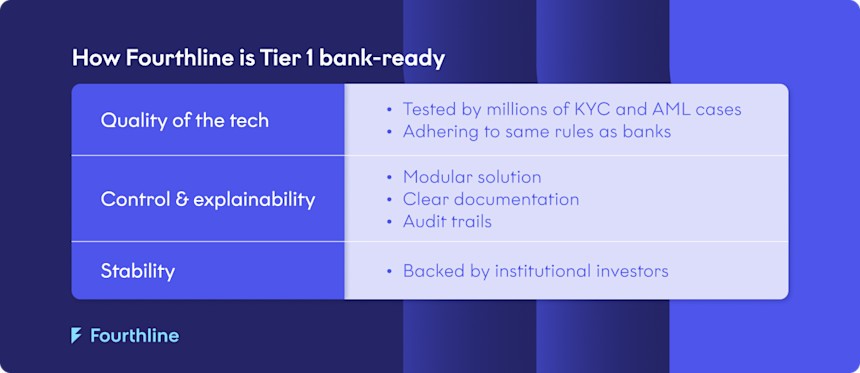Feb 19, 2024
Tier 1 banks: KYC is an opportunity and it’s time to work with a compliance partner
The Fourthline Team
When faced with challenges around know your customer (KYC) and anti-money laundering (AML), the go-to approach for Tier 1 banks today is to deploy their considerable internal resources and expertise to solve them, or to bring in thousands of expensive consultants.
And why not? This ensures you can maintain high levels of security and stability, meet compliance and regulatory demands, and guarantee the quality of these extremely sensitive customer touchpoints.
Frequently, it makes business sense, too. Tier 1 banks remain the choice of the vast majority of retail and business customers and this steady approach has proven to be resilient over the long term. Plus, solving challenges in-house helps to buttress a key competitive advantage: the trust capital that Tier 1 banks have built up with customers over decades.
The question of partnering with a third-party compliance partner for KYC and AML
Nonetheless, some cracks are appearing in this approach. Over the past few years, there have been several examples of Tier 1 banks paying expensive fines due to issues around KYC and AML, and then investing vast amounts to become compliant. On top of fines, by 2021 AML checks were costing Dutch banks alone more than €700 million a year, according to McKinsey. These costs are now so high that they are now being passed on to account holders, leading to reputational damage to go with the millions of Euros being spent.
If we step back and take a look at the escalating costs involved, the obvious question is: Why are Tier 1 banks staying the course of solving KYC and AML challenges in an expensive and manual way rather than adopting an approach which is not only efficient and scalable, but does not compromise on compliance?
Several specialist providers have already built dedicated solutions, leveraged by Tier 2 banks and fintechs alike, which are solving the same challenges more efficiently and cost-effectively than can be done in-house. This would remove the need to pass on costs to customers and free up internal resources, among many other benefits.
The reasons against partnering with compliance providers
Up to this point, Tier 1 banks have been willing to absorb substantial costs to ensure the quality of their offerings. In addition to those shared above, this is most often due to a combination of the following reasons:
1.Quality of solutions: Third-party KYC and AML solutions are seen as risky and unproven for the scale and complexity of Tier 1 banks.
2.Maintaining control over your tech is critical. If an issue arises, at least you can fix it directly. Furthermore, you need to be able to explain to regulators how the tech works under the hood. Working with an external vendor makes this difficult, especially if the solution leverages AI.
3.Compliance partner business models are still seen as risky. Even if a solution may look good, you don’t want a partner running into financial trouble.
These have been good reasons against partnering with third-party providers, particularly in the past.
Why third-party compliance providers are Tier 1 bank-ready today
As the compliance landscape matures, the reasons for not partnering with third-party compliance partners are becoming less relevant. Many specialist compliance providers are already solving a range of challenges at scale for banks and enterprises alike.
For example, if we take a look at the historical reasons against partnering with an external provider, with reference to Fourthline’s solution, the reasons don’t stand up to scrutiny.

1.Quality of the tech: Fourthline is already processing millions of KYC and AML cases in line with the same regulatory requirements that govern banks.
2.Control and explainability: The Fourthline solution is modular meaning you can start with one small, difficult-to-solve KYC or AML problem while maintaining control over every other part of the value chain. In terms of explaining how decisions are reached, Fourthline has worked closely with regulators to ensure the documentation the bank has to pass on meets the regulators’ requirements. We also provide full audit trails so customers can demonstrate how a decision was reached. Additionally, a portal allows you to audit every case processed.
3.Business stability: Fourthline is backed by a range of institutional investors.
Finally, there is one more critical reason why third parties are well-positioned to collaborate with Tier 1 banks at these important customer touchpoints.
Where Tier 1 banks have core strengths around running large, complex organizations with many competing priorities, specialist compliance providers are focused on solving a small number of problems at scale. For example, Fourthline’s core business is delivering compliant verification and AML solutions. We are therefore incentivized to maintain a laser-like focus on a few key challenges, such as staying ahead of fraud trends[2] , changes in regulations, and documentation specs and delivering exceptional experiences to our partners’ clients.
KYC and AML should be seen as proactive opportunities, not as costs of doing business
The maturing fintech landscape means that Tier 1 banks now have an opportunity to partner with stable, compliant, proven solutions, such as Fourthline, much more quickly and efficiently, without sacrificing security or quality. With the modular solutions on offer, collaborations can start small and scale as needed with very little risk.
Finally, conversations needn’t wait until a crisis occurs. By partnering with third-party compliance providers, you can take care of compliance while supporting other aspects of your business, such as process efficiency and increased conversion, rather than firefighting when a problem occurs. The result is lower costs for banks and better protection and security for their clients.
If you’d like to discuss your challenges around KYC and AML, contact us.